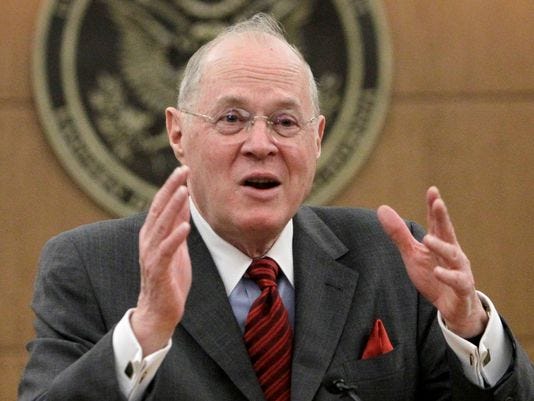 |
| Justice Anthony Kennedy |
David Cole, author, journalist, and professor of law at Georgetown University, writes in the New York Review of Books:
Together, these decisions are a consummate act of judicial statesmanship. They extend federal benefits to all same-sex married couples in states that recognize gay marriage, expand the number of states recognizing gay marriage to thirteen, yet leave open the ultimate issue of state power to limit marriage to the union of a man and woman. The Court took a significant step toward recognition of the equality rights of gays and lesbians, but by not imposing same-sex marriage on the three-quarters of the states whose laws still forbid it, the Court has allowed the issue to develop further through the political process—where its trajectory is all but inevitable.
What will the Court do when the issue of whether states can limit marriage to opposite-sex couples is put before it again? It is difficult to read Justice Kennedy’s opinion in Windsor without sensing, as Justice Scalia warned in his angry dissenting opinion, that the “other shoe” will drop eventually, and the Court will ultimately recognize that denying same-sex couples the right to marry violates the Constitution in the same way that denying mixed-race couples the right to marry does. (Significantly, in his opinion for the Court, Justice Kennedy cited Loving v. Virginia, the Court’s 1967 decision on interracial marriage, for the proposition that the state’s otherwise broad authority to define marriage is subject to constitutional limits.) But Kennedy’s opinion was nonetheless written in such a way to leave the question open while political thinking about gay marriage continues to evolve. . . .
So as a matter of pure judicial craft, Justice Kennedy could have been more clear and definite. But judging is not only a matter of craft. Justice Kennedy sought to walk a fine line—invalidating a federal law limiting marriage to opposite-sex couples without simultaneously resolving the question of whether similar state laws are constitutional. Had he pronounced that classifications based on sexual orientation are suspect and subject to heightened scrutiny, or had he held that the due process clause affirmatively protects the right of two committed adults to marry, regardless of sex, he would have, in effect, decided the broader issue. By focusing instead on the federal government’s unusual intrusion into a prerogative of state law, and its dramatic imposition of a double standard in states that recognize same-sex marriage, he wisely limited his decision to the federal law at issue. By allowing the transition to full recognition of same-sex marriage to take place gradually, Kennedy’s opinion avoided the backlash that a federal mandate to recognize same-sex marriage in every state might have triggered.
Ironically, Justice Kennedy did not join the majority opinion in Perry, the California case, which sent the issue back to district court. He dissented, joined by three other justices, and would have decided that case on the merits. Had he attracted a fifth vote for that view, it would have rendered all the care he took in the Windsor decision moot, because the Court would have had to address the question of state authority directly. The statesmanship of the two decisions, then, comes not from any one justice, but from the collective action of the court as a whole. There’s a reason we have nine justices. . . .
The justifications for denying a “dignity and status of immense import” to gay and lesbian couples are unpersuasive, whether at the federal or the state level. Same-sex couples, like opposite-sex couples, can and do make long-term commitments to live together as a family unit. They can and do raise children, pay taxes, care for dependent family members, and the like. The real reason so many states have denied marital status to same-sex couples is a sense, founded on tradition and moral disapproval, that these couples do not deserve it, simply because they are of the same sex. But the Court has already held, in Lawrence v. Texas, its 2003 decision invalidating state sodomy laws, that tradition and mere moral disapproval are insufficient grounds for differential treatment of gay and straight couples.
We will have to wait for the other shoe to drop, but drop it will.
FYI, from the Congressional Record, the Report of the House Judicial Committee, July 9, 1996, pp. 15-16, summarizing the principles and purposes of the Defense of Marriage Act then pending before the House:
Civil laws that permit only heterosexual marriage reflect and honor a collective moral judgment about human sexuality. This judgment entails both moral disapproval of homosexuality, and a moral conviction that heterosexuality better comports with traditional (especially Judeo-Christian) morality.You can read the entire report here.




























No comments:
Post a Comment